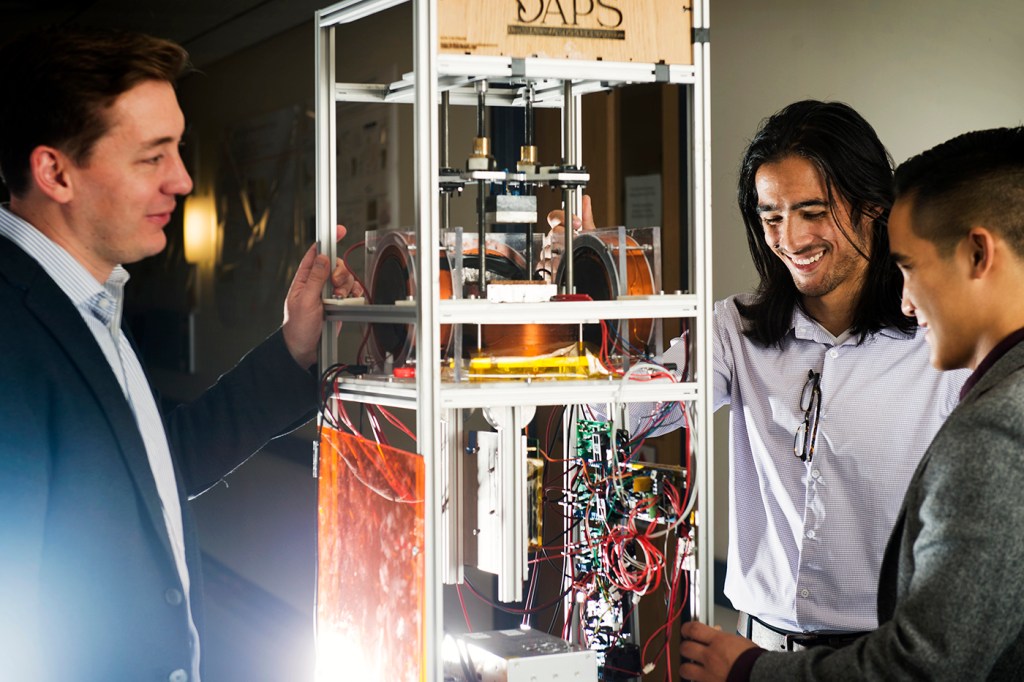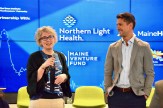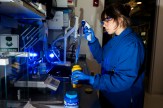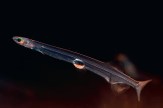Northeastern startup wins $50K MassChallenge award

3DFortify, a spinout from Northeastern professor Randall Erb’s lab, combines 3-D printing and magnetics to create the highest resolution composites to date and received a $50,000 “Gold” prize on Wednesday night at the MassChallenge Boston awards ceremony.
3DFortify was among 26 finalists in the MassChallenge Boston accelerator program, which began with 1,700 startups. On Wednesday night MassChallenge awarded more than $1 million in non-equity prizes to 16 of those finalists it deemed “the highest-impact startups” from this year’s program.
Another Northeastern startup was also a MassChallenge Boston finalist: QSM Technologies, Inc., which stems from the lab of Edgar Goluch, associate professor in the Department of Chemical Engineering. QSM Technologies, Inc., which uses a proprietary instrument sensor to identify common infectious bacteria in bodily fluids within one minute at point of care, was recognized as an “In-Kind Silver Winner” at Tuesday’s event.
‘No matter the form, 3DFortify brings the function’
3DFortify is focused on developing a new generation of custom, high-performance products for a range of applications across industries, including, for example, small airplane components that are much lighter but just as strong. Another application involves creating sturdy yet lightweight custom prosthetics for patients. “We like to say that no matter the form, 3DFortify brings the function,” said CEO and co-founder Josh Martin, a doctoral student in mechanical engineering.
Martin is a reseacher in Erb’s lab, where he and Erb work with their custom-made 3-D printers that employ their patented technology, which allows them to use magnetic fields to orient carbon fibers within a 3-D composite at the highest resolution. This is critical, Martin said, because it allows them to tune a composite’s mechanical and thermal properties. “We knew that this idea we had to incorporate our magnetic assembly with 3-D printing would provide a breakthrough in composite technology,” said Erb, assistant professor in the Department of Mechanical and Industrial Engineering. “We just had to figure out how to achieve it.”
The Northeastern entrepreneurship community has been great at supporting us.
—Karlo Delos Reyes
The team plans to use the MassChallenge award in a number of ways, including scaling up its 3-D printer to print at up to a cubic foot of high-resolution carbon fiber parts and expanding its materials platform so that it can print with more resins that are tougher, stronger and can handle high temperatures. 3DFortify also plans to open a round of seed funding.
Help from Northeastern
3DFortify launched less than a year ago, and the team credited both the MassChallenge program and Northeastern’s robust entrepreneurship ecosystem for accelerating its growth. Karlo Delos Reyes, a doctoral student in chemical engineering and co-founder of 3DFortify, noted that the team has received mentorship, coaching, and business model development from IDEA, Northeastern’s student-run venture accelerator as well as resources from the Venture Mentoring Network, which is designed to match student, alumni, and faculty entrepreneurs with experienced alumni and other industry professionals.
This spring 3DFortify also participated in an eight-week boot camp, launched by the Biotech Entrepreneurs graduate student group co-founded by Delos Reyes, that featured “crash courses” on topics such as developing a business plan, fundraising, protecting intellectual property, and creating an effective pitch. The program culminated in a final pitch competition, where 3DFortify was selected as one of the two winners to split the $1,000 grand prize.
“The Northeastern entrepreneurship community has been great at supporting us,” said Delos Reyes, PhD’18.
Added Erb: “When we first got going, we were masters of the technology, but bringing that to market was a completely foreign process. By getting involved in these accelerators, we’ve learned a significant amount of new vocabulary and methodologies that have allowed us to get our technology closer to being useful in the world.”





